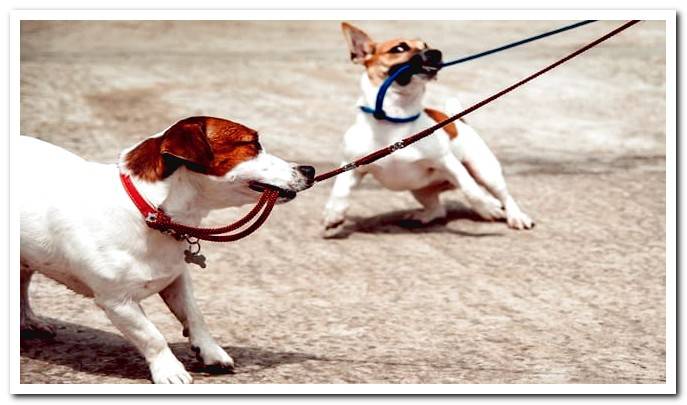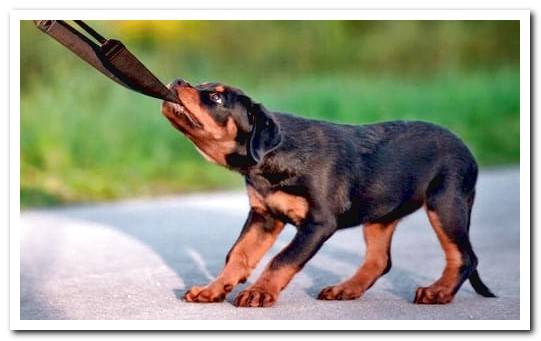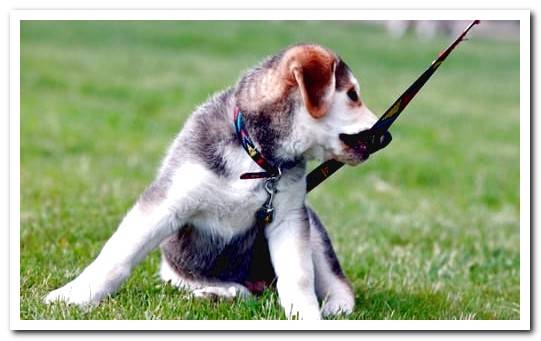
We all know how much fun it is when a dog chews on the leash, watching him tinker with it, or even get angry and try to get hold of it while pulling on it. Even more when it comes to innocent puppies, so cute and playful, but … Is it something healthy?
Although it seems acceptable behavior in most cases, over time they begin to chew the strap and even break it, not to mention how difficult it can be to take a walk quietly.
From Dogsis we are going to explain what are the reasons why some dogs acquire this type of behavior and of course, what we must do to solve it.
Index of contents
- 1 Reasons a puppy chews on a leash
- 2 Dangers of letting a dog chew on a leash
- 3 How to prevent a dog from biting the leash
Reasons a puppy chews on a leash
We refer to puppies because they are the ones who more easily acquire this funny behavior, but there are many adult dogs that also do it, so we can apply these tips to both puppies and adult dogs.

Dogs use their mouth for practically everything, eating, biting, playing, licking, picking up objects…. and therefore it is totally normal that on some occasion they try to nibble on the strap, but why do they do it?
- Curiosity and desire to play, is one of the main reasons why they chew on the strap
- Tooth pain, mainly occurs in puppies that are in full teething period
- Discomfort with the ride or the strap, where an act of rebellion occurs and the belt is gnawed as a protest
- Hunter instinct, some dogs can see the leash in motion as a prey to chase / bite
Dangers of letting a dog chew on a leash
In the first instance it is not a danger that a dog bites the leash, since at most it will end up breaking it and we can buy a new one. But this behavior is only the beginning of a series of derived problems that we can suffer.
The most imminent danger is that the leash breaks and our dog escapes, if he is very naughty he can run away and cross roads where both his life and that of drivers are in danger.
If you bite the strap, it will also jerk it, which can cause you to get caught at a loss and throw you on the ground at some point. Something that may just be a silly fall, or that can hurt us quite a bit.
Letting him bite his leash at his whim is synonymous with hinting that he can do whatever he wants, something that can cause his pack leader’s ego to over-develop and create serious behavior problems.

It can even be the case where it starts with the strap but continues with the shoes and ends up biting us, in principle playing but there can always be accidents. We must prevent our dogs from biting us, whether joking or not.
How to prevent a dog from biting the leash
Without a doubt, letting the dog bite the leash is not appropriate, whether it is a puppy or an adult dog, it is a behavior that we must eliminate. But for this, we must know what motivates the dog to bite it and, consequently, act.
Game: If our dog chews on the leash because he simply wants to play, we must stop and correct him, wait for him to release the leash and then continue with the walk. You must understand that the strap is not a toy and you have to respect it.
Pain: Young puppies mainly suffer from a lot of gum pain due to the change from milk teeth to permanent teeth. This pushes them to want to constantly bite something to ease the pain. Try to bring a toy, and when he chews on the leash, give him the toy to chew on.
Discontent or hunting instinct: Just like we did when it comes to play, we should stop this behavior, stop dead in our tracks and wait for the strap to release before starting to walk again.
As you can see it seems very simple, but the reality is that they are very stubborn and on some occasions it will be necessary to scold them so that they understand that this behavior is not right. We recommend you read: How to Correctly Correct a Dog.
